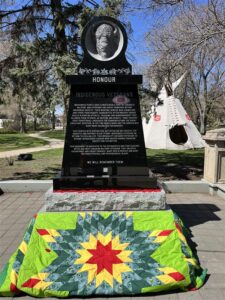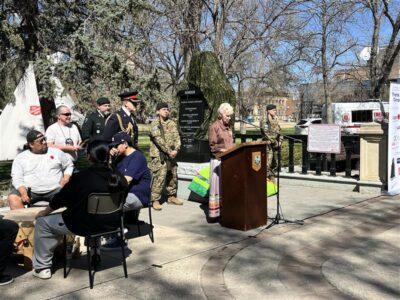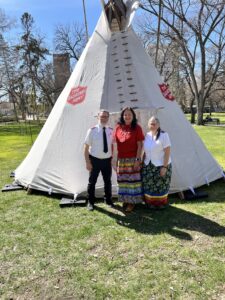
Honouring Indigenous Veterans and the Spirit of Reconciliation
On Saturday, May 3rd, The Salvation Army supported the unveiling of a monument commemorating the contributions of Indigenous veterans in Regina. On its side, the word “honour” is displayed in Cree, Lakota, Dakota, Nakota, Michif, Anihsinape and Dene.

Prominently displayed in the southern portion of Victoria Park, the monument both honours the Indigenous veterans who fought for Canada and is a symbol of reconciliation, recognizing the disparaging treatment Indigenous veterans received upon returning home.
While many First Nations, Metis and Inuit willingly volunteered for the war effort, they were denied many of the benefits and opportunities afforded non-Indigenous veterans, such as education, land grants and other financial benefits.

“This beautiful monument is a tangible symbol of gratitude for the service and sacrifices of our Indigenous veterans. By publicly saying thank you, we help to begin the process of healing,” Saskatchewan’s Lt.-Gov. Bernadette McIntyre told the media at the event.
The monument is a collaboration between Veterans Affairs Canada, numerous Indigenous veterans and several Crown Corporations. The Salvation Army was present in a support role, as they have been during numerous conflicts. Many veterans present recounted fond memories of The Salvation Army’s presence when they served.

“Being a member of the Indigenous Veterans Monument Committee, as the President of the SFNVA (Saskatchewan First Nations Veterans Association) South Branch and the Indigenous Liaison for The Salvation Army, I thought it would be a great opportunity for The Salvation Army to support the event as a way to advance our reconciliation efforts,” said Tracy Desjarlais, Indigenous Liaison Specialist for The Salvation Army. “It turned out to be a great event and advanced this partnership.”
Regina is notable for its Indigenous military history. According to Heritage Regina, at least 20 per cent of the Regina Rifle Regiment identified as Indigenous during World War II. They were part of the first wave of landings on Juno Beach on D-Day and progressed farther inland than any other Canadian unit.
This year marks the 80th anniversary of the Allied victory in Europe (VE Day) on May 8. Indigenous Veterans Day is commemorated on November 8.